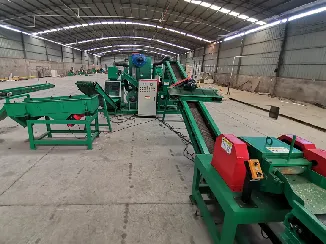

Ное . 13, 2024 15:11 Back to list
The Role of Ferrous Shredders in Waste Management
In the modern landscape of waste management and metal recycling, ferrous shredders play a crucial role. These machines are specifically designed to shred ferrous metals—magnetic metals primarily composed of iron and steel—into smaller, manageable pieces. As global awareness of recycling, sustainability, and resource management increases, ferrous shredders have become indispensable in effectively processing scrap metal and ensuring the recovery of valuable materials.
Understanding Ferrous Metals
Ferrous metals, which include cast iron and various types of steel, are commonly used in construction, automotive manufacturing, and numerous other industries. Their durability and strength make them ideal for various applications. However, as technology evolves and products reach the end of their life cycle, proper disposal becomes essential. In this context, ferrous shredders serve as a critical component in the recycling chain, ensuring that scrap metal is recycled efficiently and responsibly.
How Ferrous Shredders Work
Ferrous shredders utilize powerful blades and heavy-duty machinery to break down large pieces of metal into smaller fragments. The process begins with the collection of scrap metal, which may include discarded vehicles, machinery, appliances, and scrap from industrial sites. These materials are fed into the shredder, where they encounter a series of rotating blades that apply immense force to break them apart.
The shredding process not only reduces the size of the metal but also prepares it for further processing. Once the metal has been shredded into smaller pieces, it can be sorted, cleaned, and recycled. This is where ferrous shredders demonstrate their significance; they ensure that the metal is processed efficiently, maximizing the recovery of recyclable materials.
Environmental Benefits
One of the most significant benefits of ferrous shredders is their positive impact on the environment. By recycling ferrous metals instead of producing new ones from raw materials, we can significantly reduce energy consumption and greenhouse gas emissions. According to studies, recycling iron and steel can save up to 74% of the energy required to produce new metal from ore.

Moreover, shredding contributes to reducing the volume of waste sent to landfills. Scrap metal can take up considerable space, and by recycling it, we not only conserve precious landfill space but also lessen the environmental impact associated with waste management.
Economic Impact
The economic implications of ferrous shredders are noteworthy as well. Recycling ferrous metals creates jobs in the recycling industry, from collection and transportation to processing and resale. Additionally, the materials produced from shredders can be sold back to manufacturers at a lower cost than new materials, creating a circular economy where resources are utilized and reused efficiently.
Scrap metal markets are often volatile, yet the demand for recycled metals continues to rise. Ferrous shredders help stabilize these markets by ensuring a steady supply of processed materials, which can be used in various industries. By investing in ferrous shredders and efficient recycling practices, companies can enhance their sustainability profiles while also benefiting economically.
Future Developments
As technology advances, ferrous shredders are expected to become even more efficient. Innovations in shredding technology and material sorting capabilities are being developed to improve the recovery rates of ferrous metals. Automation, artificial intelligence, and machine learning technologies are also being explored to enhance the efficiency of the shredding process, making it possible to achieve better separation of metals and reduce operational costs.
Moreover, as the world moves closer to a circular economy, the role of ferrous shredders will only grow more critical. Regulatory pressures and increasing public awareness regarding environmental practices will push industries to adopt more sustainable waste management solutions, and shredders will be at the forefront of this change.
Conclusion
In conclusion, ferrous shredders play a vital role in modern waste management and recycling efforts. Their ability to efficiently process ferrous metals not only supports environmental sustainability but also provides significant economic benefits. As we continue to focus on innovative solutions for waste management, the importance of ferrous shredders will only increase, paving the way toward a more sustainable and resource-efficient future. Embracing this technology is not merely an industrial necessity; it is a step toward responsible stewardship of our planet's resources.
Latest news
The Future of Metal Recycling: Revolutionizing Waste Management
NewsMay.14,2025
Optimizing Waste with Recycling Lines
NewsMay.14,2025
Municipal Solid Waste Sorting Line: Revolutionizing Waste Management
NewsMay.14,2025
Metal Shredders: Essential Tools for Efficient Recycling
NewsMay.14,2025
Maximize Your Profits with a Copper Wire Granulator
NewsMay.14,2025
Home Metal Shredder: A Smart Choice for Your Home Recycling Needs
NewsMay.14,2025